Spectacle Over Substance
the case for willful political ignorance
Today’s political landscape has become a sensationalized spectacle meant to distract and polarize the masses, all while increasing the power and influence of said spectacle.
Politicians, pundits, and partisans pretend to fight for your vote, but if you’re convinced of that, they’ve already stolen something much more valuable: your attention.
My radical solution to the political ills we face as a nation is to reject the fictions that one side is good and the other side is evil, that participation in the spectacle is remotely effective, and that politicians are real people who merit our attention.
Rather, we should focus on building healthy neighborhoods and communities and effecting real political change at a local level.
Grassroots movements are our only hope if we are to survive as a nation.
The Society of the Spectacle
In 1967, French Critical Theorist Guy Debord published his polemical work, The Society of the Spectacle. The book examines the concept of “the spectacle,” or the social relationship between people that is mediated by images.
Debord begins by stating:
“The whole life of those societies in which modern conditions of production prevail presents itself as an immense accumulation of spectacles. All that once was directly lived has become mere representation.”
In what ways has representation superseded lived experience?
When people say: “last night was a movie” or “that view is picturesque,” they’re framing the representation of reality as more real than lived reality.
Art no longer imitates life; it’s life that imitates art.
This change is not inconsequential. The images that we consume that were originally meant to represent life have created their own hyperreality. Our lived experience occurs in the context of this hyperreality.1 There are few places where this spectacular hyperreality is as ever-present in the zeitgeist as contemporary political discourse.
Unity in Division
It’s important to note that the spectacle is not governed by one central body.
Conspiracy theories have circulated suggesting that certain groups control the media or that behind the scenes there’s some deep-state cabal calling the shots. The problem with these theories is that they’re reductive explanations that only serve to strengthen the spectacle.
The power of the spectacle is systemic. This system relies on the unity of division.
As Debord puts it:
“Like modern society itself, the spectacle is at once united and divided. In both, unity is grounded in a split. As it emerges in the spectacle, however, this contradiction is itself contradicted by virtue of a reversal of its meaning: division is presented as unity, and unity as division.
Struggles between forces, all of which have been established for the purpose of running the same socioeconomic system, are thus officially passed off as real antagonisms. In actuality these struggles partake of a real unity, and this on the world stage as well as within each nation.
This is not to say that the spectacle’s sham battles between competing version of alienated power are not also real; they do express the system’s uneven and conflict-ridden development, as well as the relatively contradictory interests of those classes or fractions of classes that recognize the system and strive in this way to carve out a role for themselves in it. Just as the development of the most advanced economies involves clashes between different agendas, so totalitation economic management by a state beaurocracy and the condition of those countries living under colocialism or semi-colonialism are likewise highly differentiated with respect to modes of production and power. By pointing up these great differences, while appealing to criteria of quite a different order, the spectacle is able to portray them as markers of radically distint social systems. But from the standpoint of their actual reality as mere sectors, it is clear that the specificity of each is subsumed under a universal system as function of a single tendency that has taken the planet for its field of operations That tendency is capitalism.”
So what are we being sold if not one candidate or the other? We’re being sold the illusion of choice.
As you peek behind the proverbial curtain of politics, you won’t find the illuminati pulling levers; rather, you’ll discover a system that mutually benefits opponents by legitimizing the rivalry as the only real option.
Rivalry is just another term for ‘self-sustaining duopoly’. Being consumed with the choice between Coke and Pepsi blinds us to the possibility of not drinking soda at all.
Clickbait Sensationalism
Another way of talking about the society of the spectacle is the term “attention economy.” And who are the experts when it comes to getting your attention? That’s right—the media. Once again, “the media” is not the source of the spectacle. It is merely a portion of the machine, responding to incentives in order to perpetuate the system as a whole.
Is the media biased? Of course it is! Incontrovertibly so. Every institution is biased toward its own interests. Therefore, the bias of a news organization is toward skewing stories based on the political leanings of its shareholders, as well as reporting on what will increase readership, viewers, and revenue.
Today’s media and political climate has increased polarization to a massive degree and has split citizenry along ideological lines. This has had the fascinating effect of occasionally pitting partisan support against professed ideological values.
Things that are framed in the superlative and make you feel anger, excitement, and fear are more likely to get you emotionally invested in a story enough to share it with friends (or argue about it with a stranger online).
In an attention economy, the most lucrative role is not that of problem solver, but of provocateur.
Televised ‘Reality’ vs ‘Reality’ Television
Politics is reality TV for people who think they’re smart. I know because I’ve been that person. I would turn my nose up at Love Island, but tune in every day to see what was happening on the world stage.
“All the world’s a stage, And all the men and women merely players” -William Shakespeare
We all adopt somewhat of a persona around those we don’t know—thankfully, we can be honest and candid with our real friends; but as I’ve written about previously, you can only have a limited number of friends, and politicians don’t make that cut. They are public figures, which means they have a PR team, a curated persona, and a lack of candor.
Most people know that what they see on reality TV is scripted, or at least socially engineered, cut, and edited in order to produce the desired narrative. You’re expected to suspend your disbelief in order to enjoy the production. Politics is much more conniving because it has the pretenses of reality and importance. You’re not expected to suspend your disbelief. You’re merely expected to believe.
The skills required to be electable and the skills required to be an effective leader are distinct, and unfortunately those skill sets don’t always overlap in the same person. As the spectacle becomes a bigger part of our lives, the ability to please an algorithm increases ones electability. It’s no surprise that 20 years after the first televised presidential debate, we got our first Television-Actor president. 20 years after the peak in popularity of reality TV gave us our first Reality TV Star President. And mark my words: 10 years from now we’ll have our first Social Media Influencer President.2
I think it’s fine if you want to fulfill the innate human desire for gossip and drama by watching the production that is US politics (cause it makes for damn good television), but it should be treated as a reality tv show rather than a serious affair.3
The Inverse Attention Pyramid
When we hear the word ‘politics’, it is national politics, and specifically the presidential election that are brought to mind. Rarely are people well-informed about their state representatives, and voter turnout for local elections is abysmal.4
Americans have been fooled into spending the majority of their time and attention focused on candidates and issues that are proliferated by mass media outlets; elections that your vote has a near-zero effect on.5 Time and attention are finite resources, so elections that could potentially be influenced by sincere members of the community are largely being ignored.
Imagine what would happen if we flipped this pyramid on its head:
Decision 2020
I have never voted for President of the United States, and not due to apathy or ignorance.
In 2020, I was studying political science in college. I hoped that through hundreds of hours of personal study and aided by the perspectives of my professors and classmates, I would be able to make an informed decision as to who I should vote for. I wasn’t able to arrive at a solid conclusion, but I did learn a few things through that process.
It’s rarely an easy decision- anyone who frames it otherwise is lying to you, an extreme ideologue, or is misinformed themselves.
When paying attention to politics, it’s more likely that they have an effect on you than that you an effect on them. Constant exposure to emotionally charged news, and the vitriol that accompanies popular discourse left me feeling cynical, hopeless, and drained.
I learned that it’s okay to not be informed. I’ve spent time with some of the most politically knowledgable people and some of the most politically ignorant people, and have found no correlation regarding character.
YOU ARE NOT A BAD PERSON IF YOU DON’T PAY ATTENTION TO THE NEWS.
Decision 2024
A vote is defined as: “a formal indication of a choice between two or more candidates or courses of action.”
Ultimately, I decided not to vote in 2020, but I wasn’t very public about that decision. I think I was partly embarrassed that I never reached a firm conclusion in my efforts to analyze the options.
This election I’ve decided to once again abstain from voting, but I want to formally indicate that decision. I would urge you to weigh my argument and consider doing the same.6
“With a few exceptions, it is not worth bothering to vote. We ordinary voters do not decide about things that really matter. . . Today, the majority of those who do not vote are not refusing out of protest; just relying on others to do it. Their 'No' is just a sign of indifference. What we need is an active 'No', supported by civil society movements and pressure groups. . . The threat today is not passivity but pseudo-activity: the urge to 'be active', to 'participate', to mask the nothingness of what goes on. The truly difficult thing is to step back, to withdraw from it. Those in power often prefer even a 'critical' participation, a dialogue, to silence - anything to break our ominous passivity. Only such a withdrawal will create a space for really doing something.”
-Slavoj Žižek
Final Thoughts
Things feel bleak, but I am still hopeful about the future. Your attention is precious, and your voice is heard most clearly by those around you. Therefore, I urge you to resist the pull of the spectacle and instead invest your time and energy in your local community.
What can be done?
We can limit the power of the spectacle in our lives by focusing on the real. Spending time offline, in nature, with friends and family, and serving in our communities is time not spent strengthening the spectacle.
We can intentionally abstain from voting, vote for third-party candidates, and/or support voting reform measures that prevent gerrymandering and institute alternate voting methods like ranked-choice voting.
We can be informed on local issues and vote in local elections. The great thing about local politics is if you don’t like any of the candidates, you can run or encourage someone else to.
Ignoring national politics doesn’t mean you can’t make a difference; it means you’re making a difference where it counts.
Build relationships with your neighbors, engage in local initiatives, and focus on issues that directly impact your community. The real change begins at the grassroots level, where your efforts can have a tangible and lasting impact.
In other words: we’re already living in the metaverse
and everyone will be calling it: “ThE MoSt iMpOrTaNt eLeCtIoN In tHe hIsToRy oF OuR CoUnTrY”
I would also note that gossip is actually a very important part of connection in a community and just like with politics, is most effective on a local scale
In 2020, across the US, only 15 to 27 percent of eligible voters cast a ballot in their local election
Please don’t give me bullshit about voting being your ‘civic duty’. The only way to ethically vote is to vote well, which requires epistemic justification. On a national scale this is impossible without spending thousands of hours analyzing policy proposals and their potential impact- time that could be better spent serving in your local community (which would be much more epistemologically justifiable)
I am also open to cogent arguments against mine- I’m always willing to change my mind when presented with a novel viewpoint


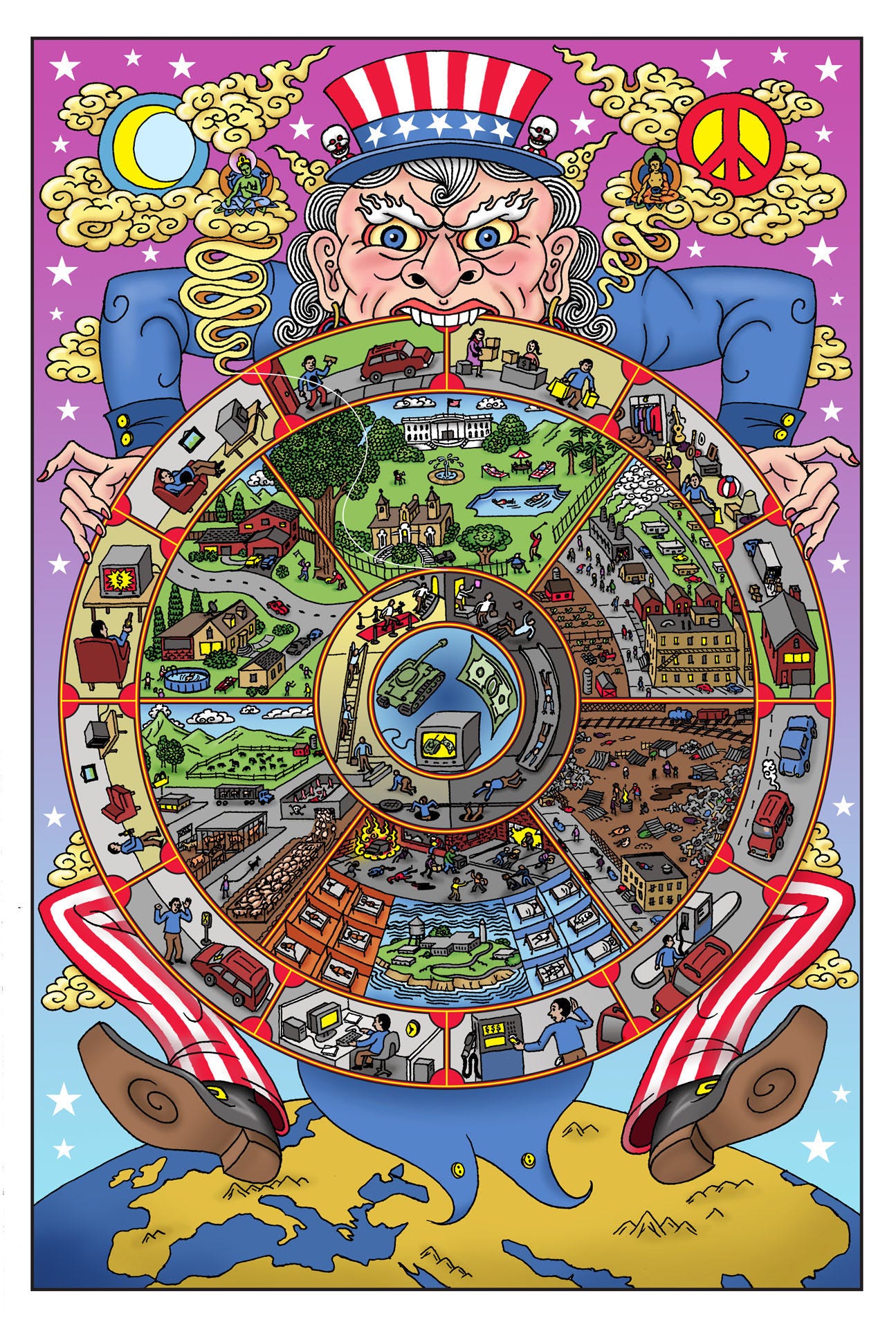
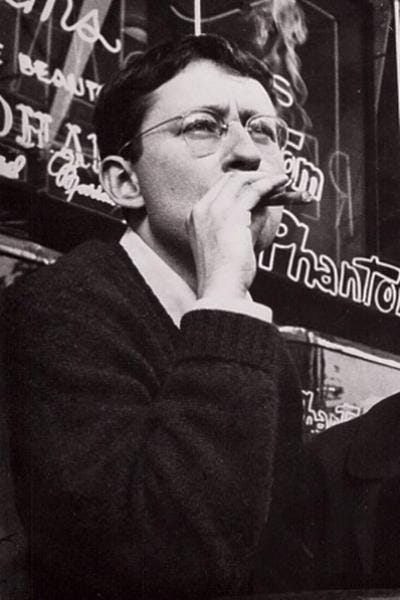
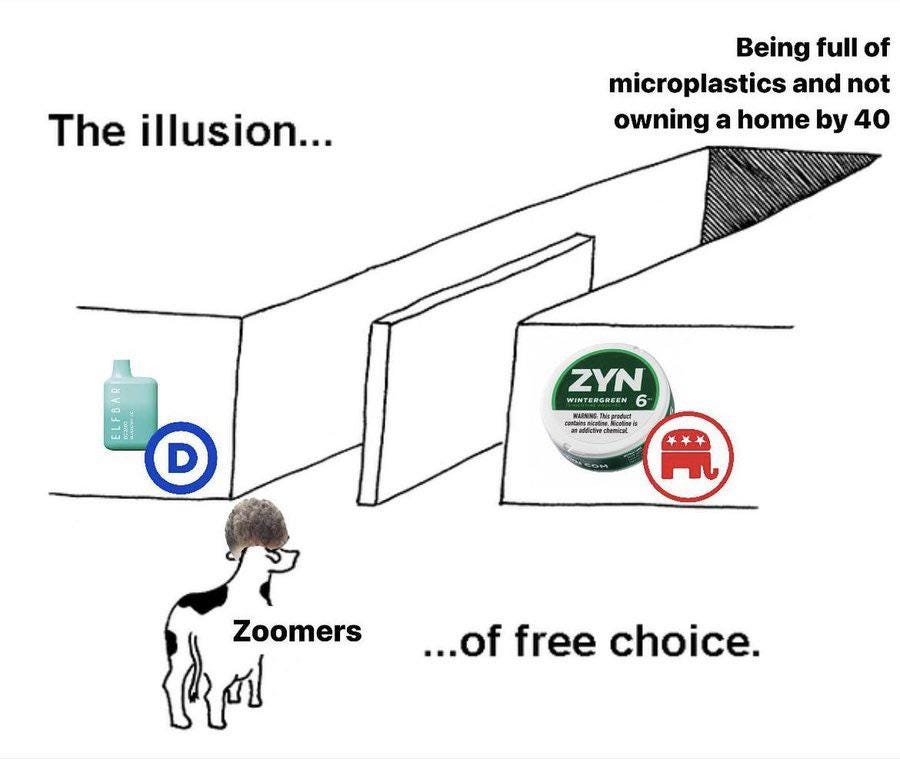
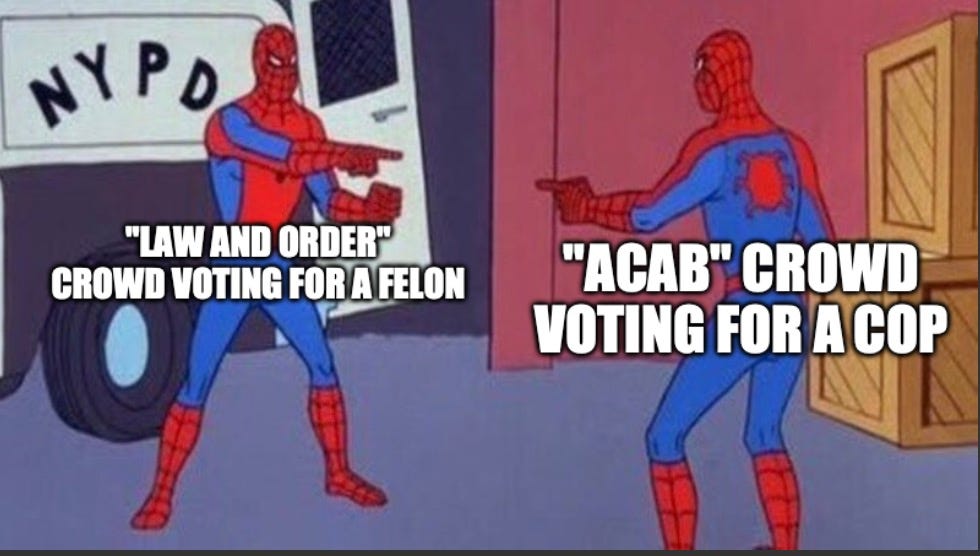
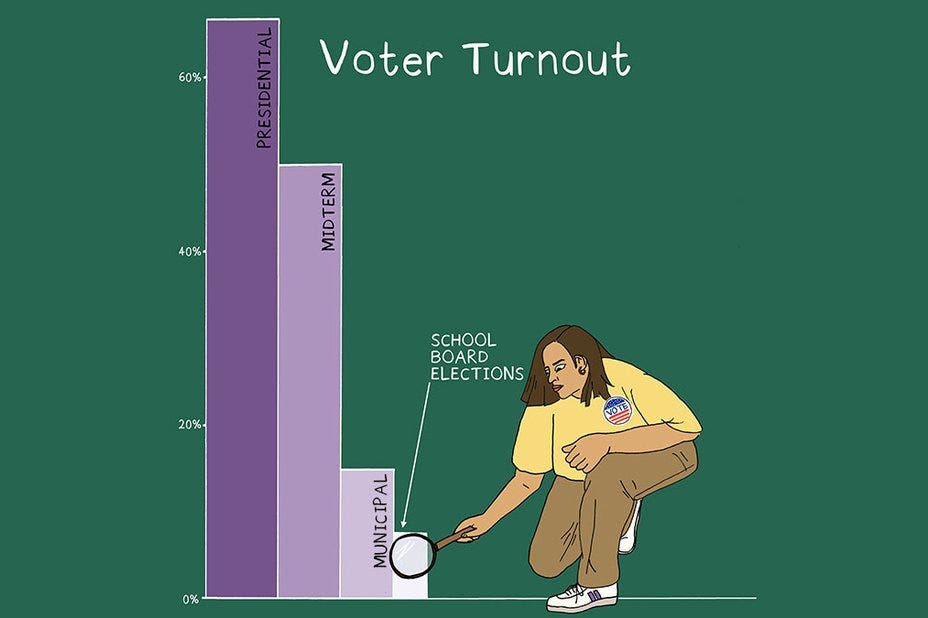
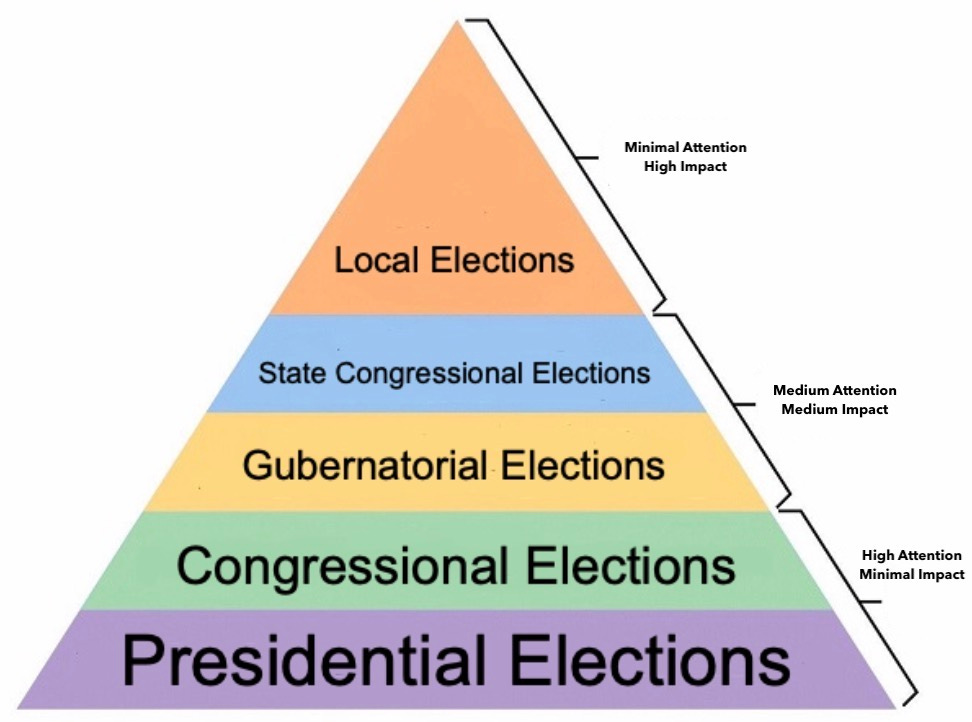
Incredibly well thought-out and articulated. Read this for the first time a couple weeks ago, and the line "reality TV show for people who think they are smart" is something that has come to mind several times since. I love the actionable solutions that are suggested, gives the article an optimistic feel that is often missing from politically critical writing.
“ When people say: “last night was a movie” or “that view is picturesque,” they’re framing the representation of reality as more real than lived reality.
Art no longer imitates life; it’s life that imitates art. “
Mind blowing!! 🤯 this was a great read. I tend to agree with you that paying too much attention to the fake fake fake can feel numbing and all-consuming. I made it a goal for the rest of the year to focus on the REAL. Thankful for your reminder that I am not a bad person because I don’t watch the news :)